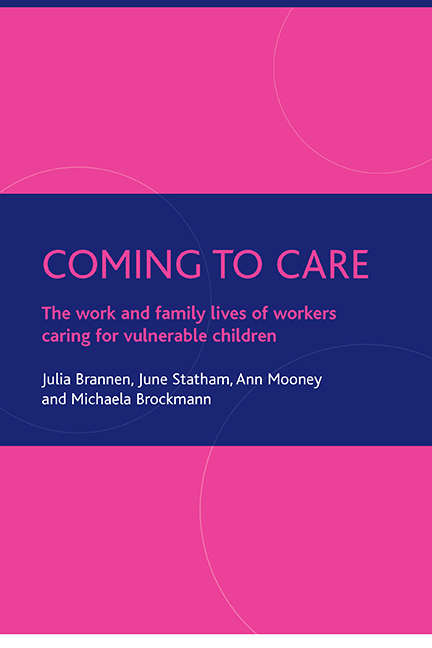Book contents
- Frontmatter
- Contents
- List of tables and boxes
- Acknowledgements
- one Setting the scene
- two The study
- three The origins of a care ethic in care workers’ childhoods
- four Entering care work with vulnerable children
- five Care workers’ careers and identities: change and continuity
- six What do vulnerable children need? Understandings of care
- seven Experiences of care work
- eight Leavers, movers and stayers
- nine Managing care work and family life
- ten Conclusions and policy implications
- Appendix: Boxes and additional tables
- References
- Index
three - The origins of a care ethic in care workers’ childhoods
Published online by Cambridge University Press: 15 September 2022
- Frontmatter
- Contents
- List of tables and boxes
- Acknowledgements
- one Setting the scene
- two The study
- three The origins of a care ethic in care workers’ childhoods
- four Entering care work with vulnerable children
- five Care workers’ careers and identities: change and continuity
- six What do vulnerable children need? Understandings of care
- seven Experiences of care work
- eight Leavers, movers and stayers
- nine Managing care work and family life
- ten Conclusions and policy implications
- Appendix: Boxes and additional tables
- References
- Index
Summary
Introduction
Negotiating an ethic of care cannot be witnessed directly but may be glimpsed in people's life histories and life stories and the ways in which informants present themselves and their lives. This chapter starts at the beginning of our story of care workers’ lives and addresses the question: to which periods or moments in their lives do childcare workers first attribute developing an ethic of care? When and where do they consider their commitment to caring for others originated? As the chapter will show, for most, their stories about care and the care ethic began in childhood, while for one care worker his entry into the world of work was given significance in early adulthood. A minority did not make reference to an ethic of care developing in childhood or early adulthood. Rather, it seems an ethic of care arose in the context of their fortuitous entry into care work, which they attributed to particular events and circumstances, to be discussed in Chapter Four.
It is unsurprising that childcare workers regarded childhood as an important period in their lives since they subsequently chose to work with children who had been neglected or abused. Childhood is a time in which we learn what care is from the position of receiving care. It is a formative period in which care is experienced intensively from our parents and from a variety of significant others. It is also a critical time for the individual's psychological development. The idea that children's relationship with parents is important and affects the quality of their relationships with others in later life is key to many theories of psychological development (Freud, 1949; Erikson, 1950). The development of an ethic of care is seen by development theorists to depend upon the nature of care received and the process of identification with primary carers so that being loved develops and extends the resources of the loved one in order that they can come to love others (Hollway, 2006).
The process of learning to care can work in another way also: the feeling of being unloved as a child by a parent may produce a determination or resolution in that person not to reproduce unloving relationships with one's own children and with others. In short, over time individuals identify with or reject the models of care that their parents and other family members offer them (Kellerhals et al, 2002).
- Type
- Chapter
- Information
- Coming to CareThe Work and Family Lives of Workers Caring for Vulnerable Children, pp. 39 - 58Publisher: Bristol University PressPrint publication year: 2007



